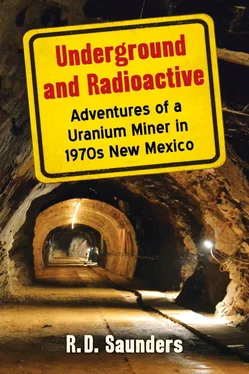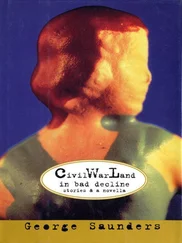As good as Hill was, I discovered that he had worked several mines in the Ambrosia Lake area, becoming somewhat of what we called a tramp, but not in the vagrant sense of the word. For whatever reason they tramped from one mining company to another, I suppose looking for greener pastures. Tramp miners, or helpers and laborers, for that matter, generally knew a lot more than someone like me, as they had seen a variety of ways other mining companies operated.
Section 35 seemed to attract a lot of tramp miners because of the exceptionally fair contract system that was used. Again, not all mining companies paid contract rates in place of a flat hourly rate. Having seen how much of an incentive contract mining could be, I always wondered how other hourly rate companies kept their production up, or their best miners, for that matter.
Hill didn’t hang around any one place for long, apparently, and one day he vanished without a word to me. There was a rumor he had moved on to uranium mining in Green River, Wyoming, but nobody knew. Shotgun immediately assigned Bill Davis to work opposite Art and me.
Davis was another of Cal’s former helpers and another very good miner. Apparently he had learned a lot more about mining from Cal than I had and had become a top earner. Davis knew Cal had liked me and knew I was good at a few things, so we got along just fine. Soon we got into a routine similar to what Hill and I had. Bill would drill and blast, and I would muck and build square-sets. I’m not sure that either Hill or Davis knew what was happening by my always ensuring they would drill and I would timber, but it kept on working, and everyone was happy.
Davis and I had been working opposite shifts for a few weeks when Mel called me into his office and told me from now on I would be mining the stope alone and working twelve-hour shifts.
I had heard of a few miners working twelve-hour shifts in stopes that were high-priority, high-grade ore areas. In those stopes each shift of a miner and helper would work twelve hours on and twelve hours off, keeping the stope producing twenty-four hours a day. I had never seen or heard of an average stope having a single crew working twelve-hour shifts with no opposite crew. From now on I would be working from 4:00 a.m. to 4:00 p.m. each day.
Not being too thrilled about the twelve-hour shifts was one thing I was able to overlook fairly easily. I was really pleased at being able to work alone with no opposite crew to answer to and even more excited at the prospect of a bigger paycheck by working those sixty-hour weeks.
True, it was very unusual but not unheard of for a miner and a helper to work an average stope without a crew working opposite them, but Cal had always done it. If Cal could it then I could do it, I thought.
Bill was also assigning me a new helper, Jack Stutts, who I knew peripherally from having worked with him occasionally early on when I had been assigned to the station loading and unloading supplies. Not a bad worker but not a go-getter, and he complained.
Some of the work we did was painful, and one surefire way to make it worse was listening to complaints from Stutts. The entire day was about how much he was hurting and how little we were being paid. I had no such complaints considering what I had been getting paid prior to hiring on at Kermac, but thanks for reminding me about the pain, Jack.
Evidently Stutts had finally moved up and was now a helper. He was no kid, having been underground for quite some time, though without making much progress. Additionally, I came to find out that he had recently been assigned to several miners, each of whom had unloaded his complaining butt.
Stutts was otherwise a likeable enough guy in his late twenties. He was very thin, was about five foot eight, and didn’t appear to be able to do the kind of heavy lifting required in a timber stope. I was worried he wouldn’t be able to either lift or reach up high enough to set eight, ten, and twelve-foot posts for our square-sets. I need not have been concerned; he was one strong little guy who could do the work.
Being somewhat of a tramp himself, Stutts had worked in several mines as a helper over the years and for many miners in a variety of stopes. Frankly, he seemed to know more about mining than I did. He talked a good game, and that was the problem: talk.
I found that in addition to complaining, Stutts talked a little too much, and he asked too many questions. I got especially annoyed when he asked what we were doing, because I didn’t know a lot myself at the time. I ignored most his inquiries. I felt right away that he wouldn’t last long with me.
A lot of people, me included, were called pard rather than by first or last name, but some people, including my new helper, were known by their last names only. I would have preferred pard, but I sensed he seemed to prefer being called Stutts, so I conformed.
Twelve-hour shifts proved to be difficult. During an eight-hour shift, we would work about six hours maximum. The other two hours were spent getting dressed, going down and up in the cage, and walking back to the stope. During twelve-hour shifts, we were working ten hours.
It was life in the dark during those shifts. We would report for work at 4:00 a.m. and get off at 4:00 p.m. During the winter months, it was already dark by the time I exited the mine after a shift, and there were times I would barely see the sun at all.
No extra laborers were showing up at 4:00 a.m., so if Stutts didn’t report, I couldn’t work for at least four hours or until the day shift arrived and I could be assigned a temporary helper. Thankfully Stutts was good about coming to work, but because we could never work alone, there were some days I sat in the lunchroom fuming for four hours waiting for a helper.
Our production was surprisingly good. We averaged around twenty-five dollars an hour. Staying true to what I had learned from Cal, I gave my helpers four hours of contract time on eight-hour shifts and six on twelve-hour shifts.
I learned more about drilling, blasting and timing the patterns working alone. When I made a mistake, I was accountable only to myself to fix it, and only I paid for it in the way of reduced contract rates. I had settled in to being a lead miner.
Being underground without light meant perfect darkness. There were no reflections, no glints, no shadows. There was only blackness. I could hold my hand a fraction of an inch in front of my face and see nothing. It was the essence of black.
Sometimes I would turn my light off to stand in total darkness. I found that disorienting to the point where I would lose my equilibrium, becoming unsure of whether I was standing straight up or leaning over. It was a very odd feeling.
I spent a good deal of whatever downtime I had sitting in the dark, listening. I noticed that sounds seemed to be amplified. I could hear the motors rumbling on the track below, ventilation fans humming, and, faintly, the far-off sound of a machine drilling in another stope. Occasionally there would be creaking from stulls or square-sets as the pressure of the earth slowly compressed them and the sound of a small slab falling somewhere nearby. Fascinating stuff, but only if being in the darkness was voluntary.
As happened to almost everyone at one time or another, I inadvertently picked up a partially charged battery from time to time, and my lamp would go out during a shift. Most often there was a partner around to go fetch another battery, but not always. In that case I found myself sitting in the dark, waiting for someone to wander through.
Without an alternative light source and alone, it was best to sit and wait to be found should your lamp go out. Usually a partner would show up or a shift boss would amble by, but no experienced miner, partner, or laborer was ever without light unless it was planned. And no miner, helper, or laborer I knew ever sat and waited for anything. That was why everyone carried a disposable butane lighter.
Читать дальше












